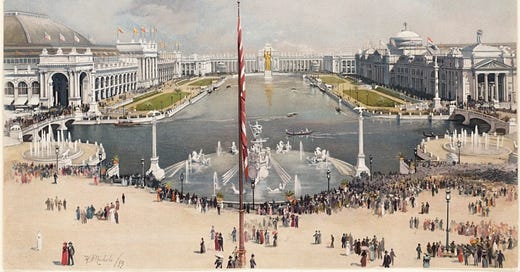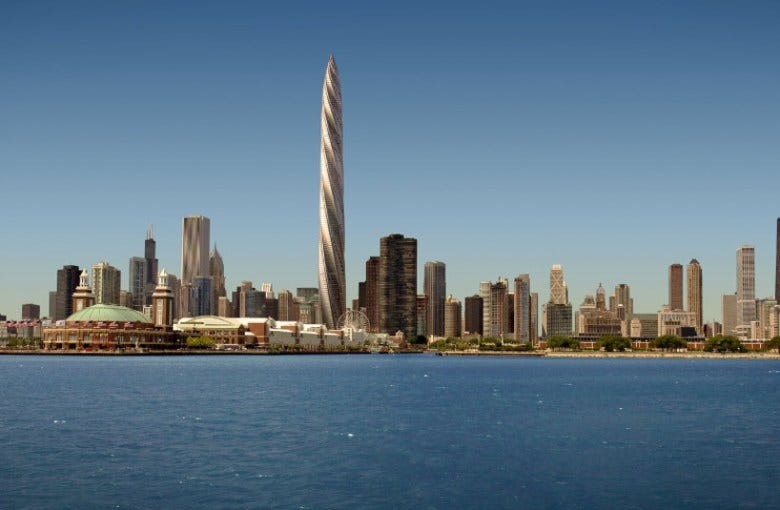This was the Chicago World’s Fair. In just under two years, the city transformed itself into a shimmering wonderland of neoclassical architecture and technological spectacle. This was one of many world fairs at this time, which were celebrations of human ingenuity and innovation. The fairgrounds, covering over 600 acres, sprang up almost overnight from the marshy shores of Lake Michigan, a barren stretch of land that was largely undeveloped. The fair introduced the world to electric lights on a grand scale, with the newly developed alternating current lighting up the night, while architectural wonders like the Ferris Wheel (coming in at 264 feet) redefined what was possible in human design. It was a triumph of speed and vision.
Society has changed. Fast forward to 2005. The Chicago Spire is announced.
It was supposed to be the tallest residential building in the world. Fast forward to 2024, and after stall after stall, all we’re left with is a massive hole in the ground. As Trump would say, SAD!
What does this have to do with the Democratic party? Well, Kamala lost, and all the Democrats are in a hurry to blame this and that. It's time to move on. The 2028 election is going to be a special one. It will be the first time since 2016 that both parties will have full-blown primaries, and also the first election since 2016 that Trump won’t be a part of.
There is a power vacuum, and this is what it should be filled with.
Imagine a party that isn’t focused on economic bean counting, but instead on increasing the pie. Imagine a party that attracted the elite human capital of Silicon Valley. Imagine a party that said things like “we want to help out disabled people, so we’re partnering with Elon Musk to develop and make neural link technology more accessible.” “We want to make the poorest Americans better off, so we’re going to deregulate housing so the market can bring housing prices down.” “We want to catch up to other developed countries’ infrastructure, so we’re going to invest in high-speed rail.” Imagine a party that wanted to terraform the Western United States, shifting rivers around and creating new cities. Imagine a party that wanted to build lunar colonies!
What the staff here at Outrageous Fortune are proposing is an optimistic, vitalist party. The Democrats and Republicans currently embody various shades of pessimism. Listen to Trump speak. There are glimmers of optimism here and there, but most of it is immigrant fear-mongering, economic decline, and cultural collapse. The democrats are worried, worried about what they can or can’t say, worried about whether to get a plastic or paper straw, worried about other’s feelings, worried about everything! Let’s change this. I’m not particularly tied to the Democrats, but they seem like the more receptive party of the two for this agenda.
The main reason: Which party is more pro-market today? The lines have blurred. Republicans have embraced protectionism, embraced anti-immigration, and don’t care too much for the rule of law, which is essential for creating a conducive environment for growth. All of this has alienated libertarians, which the Republican party have realized are expendable. Great. Libertarians have been disowned? Bring them over. Much of big tech breathlessly talk about techno-futurism and big societal goals. They will drift towards the Democrats as well. Let the Democratic party unleash technological abundance on the masses, while still keeping their sympathetic Rawlsian impulses that unite their coalition together. This would keep the core base, the left-wing progressive types, and anchor in those pesky suburban men in Detroit who would love the idea of a richer tomorrow. And you can forget all about the Democrat’s issue with appealing to young men with this exciting agenda.
Back in the 19th century, Americans felt this great sense of progress, of striding confidently forward. In 1850, American life expectancy was around 40 years, flickering oil lamps lighted most houses, and communication moved at the pace of a horse-drawn wagon. By 1900, just 50 years later, the skyline of New York shimmered with steel towers, and electricity now lit the streets and powered homes. The telephone was a fixture in offices and homes. Mass transit systems expanded, connecting city dwellers in ways unimaginable a generation earlier, and railroads crisscrossed the continent, turning distant lands into accessible frontiers. The average American lived 12 years longer, thanks to advances in medicine and sanitation. Once fragmented and rural, the nation was now a unified, dynamic force—a country reshaped by the relentless forward march of innovation, progress, and ambition.
Any policy agenda the democrats put forward in 2028 should include finishing the Chicago Spire promptly, if nothing else then as a symbol of what’s to come.
It’s time to build. We need to build more housing, we need to build a functional healthcare system, and we need to build more solar panels and computer chips. We need investment in AI, in nuclear, in space. Most will know we won’t go to Mars or the Moon by 2030, and politicians know that too. But optimism is a vibe, so throw it in the policy agenda.
There’s lots of low-hanging fruit to pick for future Democrats to campaign on. For example, in the 1970s, for fear of noise, congress banned commercial supersonic flights. The market has been slowly innovating in noise reduction since then. At this point, supersonic commercial airliners can be manufactured with almost no noise and could cross the continent in about 2 hours. And that is largely without the price incentive. Imagine what the market could unleash in commercial aviation if the ban was lifted. Scrapping this regulation has got to be on the Democratic abundance agenda as well.
James Pethokoukis writes the blog Faster, Please! His up-wing agenda is a great inspiration for this vision of the democratic party. Tyler Cowen’s First Law states that there is something wrong with everything, by which he means there are always flaws in arguments. This law is a powerful tool for intellectual honesty. And I’ll be honest, the weakest part of this argument is the practicality. But James gives me hope. Every day, technology makes our lives better. Last week, James wrote about gene-edited crops helping to mitigate climate change, robots working in nursery homes, and Ozempic performing miracle after miracle. Realistically, this policy platform could be achieved in the Democratic party, if they can figure out a way to align innovation with progressive goals like economic inclusivity, job creation, and environmental sustainability. The Democrats have always been progressive, but oddly skittish when it comes to technological innovation. I think this is an asymmetry that could easily be changed for the better. And like James, I shout, Faster Please!
In the long run, economic growth is practically everything. Global GDP has grown at around 2 and a half percent for the past 200 years. If it had grown at 1.5 percent instead, just one percent less, then humanity would be 37% as rich as it is today, with a per capita GDP of about 6,000 instead of 16,000. We need a party to step up to the plate when it comes to making the average American wealthier. If the Republicans refuse, the Democrats need to capitalize on this opportunity.
For so long it’s felt like the Democrats have been the party of losers, Hillary and now Kamala, and sure Biden won in 2020, but his leadership style isn’t exactly rejuvenating. Let’s change that. Let’s start winning again, less as a party and more as a country. Let’s get a young, upward-focused candidate, from a vital, optimistic party. The Republicans will continue to embrace identity politics and economic populism, drifting further away from growth-oriented policies, and further into stagnation and isolationism. China, Iran, and Russia are either on the march or threatening to be, jeopardizing democracy and economic freedom around the world. If not the Democrats, then who will protect democracy around the world, if not the Democrats, then who will fight for techno-futurism? It’s time to frame the Democrats as the type of progressive they always should have been, accelerationists.






